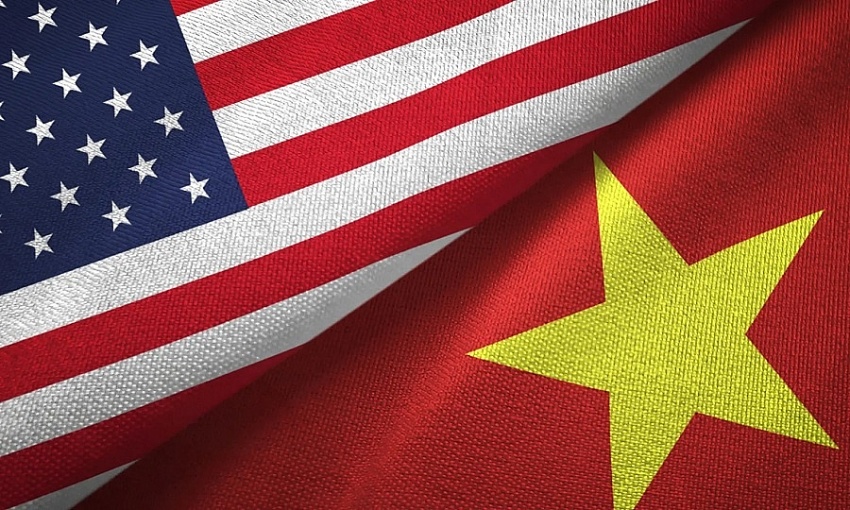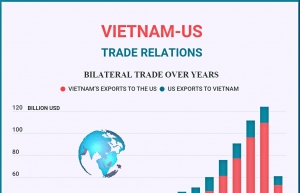Momentous year for US-Vietnam relations
 |
| Momentous year for US-Vietnam relations, photo: VNA |
The government has tasked the Ministry of Planning and Investment (MPI), Ministry of Science and Technology, Ministry of Foreign Affairs, and Ministry of Industry and Trade with setting up discussions between officials of Vietnam and the US on realising commitments set out in the new comprehensive strategic partnership established last autumn.
According to the US State Department, the US is now advancing cooperation with Vietnam on economic security, with a focus laid on increasing trade opportunities, clean energy promotion, semiconductor and supply chain cooperation, following US President Joe Biden’s state visit to Vietnam last September.
On January 25, US Under Secretary of State for Economic Growth, Energy, and the Environment Jose Fernandez met with Vietnamese Prime Minister Pham Minh Chinh in Hanoi, “reaffirming the United States as an enduring partner and expressed support for the rapid development of Vietnam’s semiconductor ecosystem as part of the US-Vietnam Comprehensive Strategic Partnership. This effort includes cooperation to launch workforce development initiatives.”
PM Chinh told Fernandez, “It is suggested that you continue pushing the US side to soon consider recognising Vietnam as a full market-based economy and remove barriers related to exportation of high technology against Vietnam, and that the US continue sharpening its cooperation with Vietnam in all sectors based on the spirit of benefit harmonisation and risk sharing, including many new breakthrough sectors such as innovation, AI, supply chain, green transformation, and especially the semiconductor supply chain.”
According to Fernandez, the US and Vietnam are now in a superb position to boost their partnership, and the US stands ready to assist Vietnam in developing a semiconductor ecosystem including human resources training and semiconductor trading promotion.
The US official said that the US was positively considering and solving issues proposed by Vietnam, especially when it came to the market economy status and hurdles related to high technology.
At a media briefing over a week ago in Hanoi, Fernandez revealed that 15 US unnamed companies operating in the sectors of semiconductor and green technology had stated interest in Vietnam’s chip and clean energy industries, with investment mounting to about $8 billion.
One of the key reasons is that Vietnam is in the process of growing its chip production in response to a growing demand thanks to steady global adoption of AI.
Last September, Vietnam and the US forged a new semiconductor partnership to support resilient semiconductor supply chains for US industry, consumers, and workers.
The partnership is reflected via the signing of a memorandum of cooperation on semiconductor supply chains, workforce and ecosystem development, which will formalise this bilateral partnership to expand the capacity of the semiconductor ecosystem in Vietnam, supporting US industry.
Under the International Technology Security and Innovation Fund, created by the CHIPS Act of 2022, the US will partner with Vietnam to develop Vietnam’s current semiconductor ecosystem, regulatory framework, and workforce and infrastructure needs.
The comprehensive workforce development initiatives in Vietnam will jointly develop hands-on teaching labs and training courses for semiconductor assembly, testing, and packaging. The US government will provide initial seed funding of $2 million to launch the initiatives, in conjunction with future support from the Vietnamese government and the private sector. The effort will support the expansion of good jobs for the American middle class for work further up the semiconductor industry value chain.
According to a statement from the White House, the US recognises Vietnam’s potential to play a critical role in building resilient semiconductor supply chains, particularly to expand capacity in reliable partners where it cannot be re-shored to the US and promote manufacturing and industry development at home under the US CHIPS Act.
The MPI has been assigned to formulate a scheme on semiconductor manufacturing, in the context that the nation has put its state-of-the-art National Innovation Centre into operation, including semiconductor research and development.
The US has set priorities on developing resilient and secure supply chains with Vietnam because the Southeast Asian nation has already demonstrated the capacity to produce semiconductors to world standards with American companies like Intel and Amkor.
“Semiconductors are of vital importance to US manufacturing. The US and Vietnam have become trusted partners based in years of dealing with each other,” said Carl Thayer, emeritus professor at the University of New South Wales.
“The US has chosen to prioritise AI and quantum computing because these are the frontier technologies for the future. Vietnam has also set priority on Industry 4.0 technology, so the views of Vietnam and the US are congruent. The US would also like to develop green energy technology with Vietnam.”
According to the joint leaders’ statement on elevating US-Vietnam relations to a comprehensive strategic partnership released, Vietnam and the US decided to strengthen science, technology, and digital innovation cooperation, regarding this as a new breakthrough of the comprehensive strategic partnership.
“The US has declared its commitment to increasing support for Vietnam in the training and development of a high-tech workforce. Acknowledging Vietnam’s tremendous potential as a major player in the semiconductor industry, the two leaders pledged to support the rapid development of Vietnam’s semiconductor ecosystem and to work together energetically to improve Vietnam’s position in the global semiconductor supply chain,” the statement read.
In the coming months, Vietnam and the US will organise dialogues on these important cooperation sectors. PM Chinh said that Vietnam was now quickening the implementation of a programme on training 50,000-100,000 high-quality engineers for the semiconductor industry, improving the quality of legal regulations for renewable energy, and ameliorating the quality in zoning of rare earth, accordingly helping Vietnam to draw in foreign investment in specific projects.
According to German data provider Statista, revenue from Vietnam’s semiconductor market is forecast to hit $20.15 billion this year and post a compound annual growth rate of 11.62 per cent in 2023-2027, for a market volume of $31.28 billion by 2027. The largest market within the semiconductor industry is integrated circuits, with a projected market value of $16.44 billion this year.
MPI figures show that cumulatively as of December 20, 2023, total US registered investment capital in Vietnam reached nearly $11.83 billion for nearly 1,340 valid projects, making the US the 11th largest foreign investor here.
Two-way trade between Vietnam and the US increased from $450 million in 1995, when the two countries established their diplomatic relations, to $110.6 billion last year.
 | Vietnam - US trade relations Along with sound political relations, economic-trade ties have been one of the most successful endeavours within Vietnam-US relations. The US is currently one of Vietnam’s largest trading partners. |
What the stars mean:
★ Poor ★ ★ Promising ★★★ Good ★★★★ Very good ★★★★★ Exceptional
 Tag:
Tag:
Related Contents
Latest News
More News
- Hermes joins Long Thanh cargo terminal development (February 04, 2026 | 15:59)
- SCG enhances production and distribution in Vietnam (February 04, 2026 | 08:00)
- UNIVACCO strengthens Asia expansion with Vietnam facility (February 03, 2026 | 08:00)
- Cai Mep Ha Port project wins approval with $1.95bn investment (February 02, 2026 | 16:17)
- Repositioning Vietnam in Asia’s manufacturing race (February 02, 2026 | 16:00)
- Manufacturing growth remains solid in early 2026 (February 02, 2026 | 15:28)
- Navigating venture capital trends across the continent (February 02, 2026 | 14:00)
- Motivations to achieve high growth (February 02, 2026 | 11:00)
- Capacity and regulations among British areas of expertise in IFCs (February 02, 2026 | 09:09)
- Transition underway in German investment across Vietnam (February 02, 2026 | 08:00)





















 Mobile Version
Mobile Version